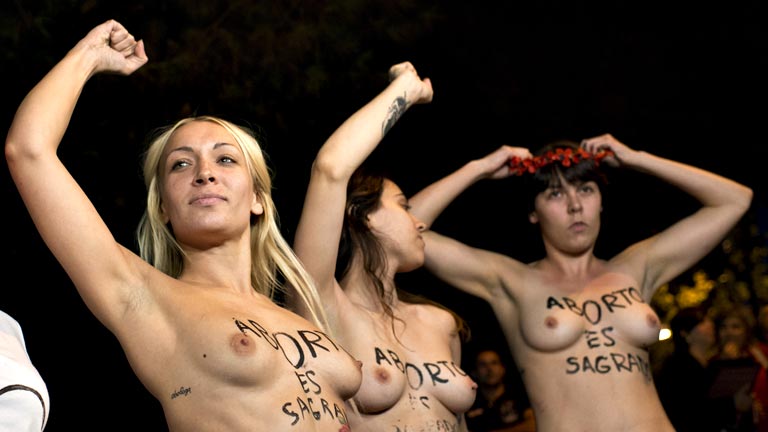Nothing greater than the Femenomenon has arrived to the European “political life” since Cicciolina; and even better, since Ilona Staller was a professional actress, which only hampers the arousal, whereas these glowing youngsters of glorious traits are true impromptu performers full of inspiring freshness. They claim fighting the sex industry and, by my faith!, sex industry has come across hard contenders, because there are no professionals apt enough to compete with the natural, willing and fervent strip from convinced exhibitionists. Besides, not without reason has always been told that those coming from nuns’ schools are the best, the most prurient and daring. Never, oh!, pleased the gods to give me such a lover. I wish the FEMENist movement big success and prosperity, and may the recruit many new members, to bestow their triumphant youth onto papers’ front pages and to news’ backgrounds, thus ousting the boredom of porn magazines and movies. If Femen does us this mercy, I laugh at the sanctimonious scenes of prudish Hollywood, and at the cheap strippers of Spanish cinema.
Besides, these women have operated big changes in me. While feminism was a matter of fat, ugly women, I confess that it never got a hold on me; but this new Femenism won my support for their cause in thirty seconds since their first performance, months ago. Now they make their premier in Spain and the totally win my will. Now I’m an enthusiastic and convinced Femenist. Not any longer I see, like before, objects of desire in these angels’ bodies, but desirable tools or weapons for protest; and I subscribe any motto as long as it comes written in their divine skin-banners. Their twin arguments, merrily looking to heaven, thanksgiving for all that wonder with their big blind eyes, have an overwhelming strength. I collect their swollen sentences, steady like faith, and I set them as my desktop background to show the north of my dreams, and to season my dawns.
Divine Femenists, sweetest Lara, I call on you! Pack out the media, the whole country, with your combat weapons, and keep scandalizing the religious moral of this inveterate sinner.
-
Recent Posts
Archives
Categories
Meta

